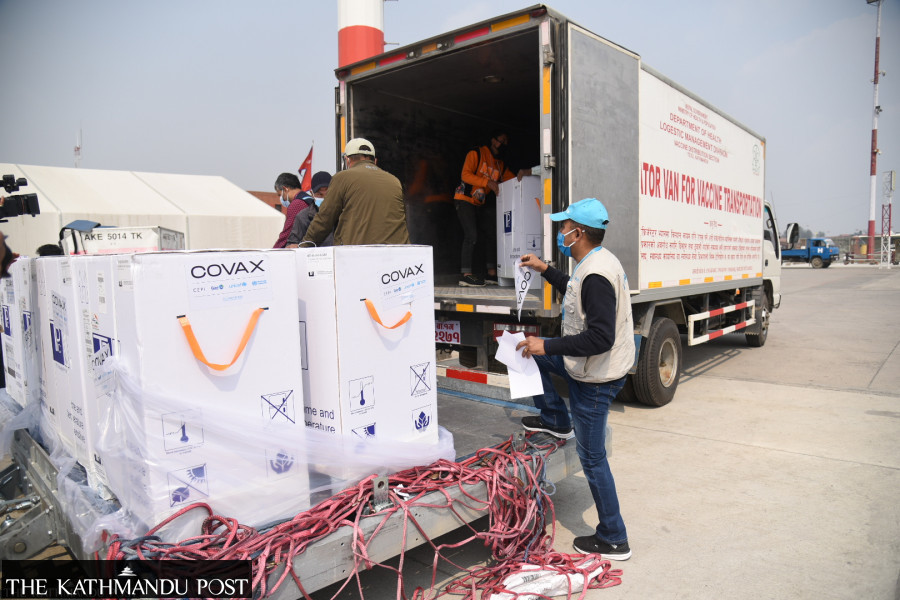Health
As Covid lingers, Nepal asks Covax for 1.6 million vaccine doses
Shots are available at Sukraraj Hospital, Teku. Those in the risk group can get fresh jabs.
Post Report
Amid reports of an increase in the number of Covid cases, the Ministry of Health and Population has asked Covax to supply 1.6 million doses of coronavirus vaccine.
The amount is among the 2.5 million doses that Covax, the United Nations-backed international vaccine sharing scheme, has committed to supply, officials say.
“We will administer the vaccine doses to the risk groups including the elderly and those having comorbidities,” said Dr Abhiyan Gautam, chief of Immunisation Section at the Family Welfare Division of the Department of Health Services. “Further requests for vaccine doses will be made based on the demand in the country.”
The facility supplied millions of doses of coronavirus vaccine, which were used to inoculate the majority population of the country.
Of late, Nepal’s major hospitals have reported coronavirus infections. Doctors say elderly people and those with underlying conditions have been getting severe from Covid. Some infected people, whose health conditions were severe, are being treated in intensive care.
Health authorities across Nepal have stopped active case findings including contact tracing and free testing for all after the second wave of the pandemic subsided in 2021. Hospitals have been carrying out tests only on those seeking polymerase chain reaction (PCR) testing to go abroad or seriously ailing patients with respiratory illness.
Those seeking test reports are seemingly healthy people but even some of them are testing positive for the coronavirus. Some people with fever and flu are also testing positive for the coronavirus.
Doctors say many people infected with Covid could be asymptomatic and they can pass the virus to others. Elderly and those with compromised immunity get severe from Covid. Doctors ask people of the risk groups to get inoculated at the earliest.
Currently, Covid vaccine is being provided from the Teku-based Sukraraj Tropical and Infectious Disease Hospital. Hospital administration said that anyone from risk groups or those who have not taken the first dose, second dose or booster shots can visit for inoculation.
“Our hospital has been administering the coronavirus vaccine,” said Dr Yuba Nidhi Basaula, director at the hospital. “But the uptake has been low. Only around 20 people have been coming for Covid vaccination daily.”
The hospital said Pfizer-BioNTech’s bivalent Covid vaccine is being administered between 10 am and 3 pm every day.
The Pfizer-BioNTech’s vaccine is the only bivalent jab that has got an emergency use approval from Nepal’s drug advisory committee.
The bivalent Covid vaccine includes a component of the original virus strain as well as a part of the Omicron variant to provide a broad protection against Covid.
Nepal had confirmed the spread of the JN.1 sub-variant of the coronavirus in the country in January. The World Health Organisation classifies JN.1 as a separate ‘variant of interest’ given its rapid spread around the globe. The UN health body, however, said that based on available data, “the additional public health risk posed by JN.1 is currently evaluated as low”.
Officials at the Ministry of Health and Population said, of late, people mostly returning from India have been testing positive for coronavirus.
Thousands of people from both countries enter each other’s territories every day on top of the large number of those who use unregulated points along the porous border.
Though health authorities have not carried out whole-genome sequencing, experts say the sudden rise in infection rate and severity in the elderly and comorbid people could be the reason for the change in virus variant of seasonal flu and coronavirus.
Public health experts have urged authorities concerned to carry out whole-genome sequencing , which is a comprehensive method of analysing the entire DNA sequence of an organism’s genes. Researchers believe that whole-genome sequencing can help track the virus’s severity and properties.
As cases in the hospitals keep rising, doctors suggest the public to avoid crowds and follow public health measures such as washing hands and wearing face masks, among other things.




 13.12°C Kathmandu
13.12°C Kathmandu














